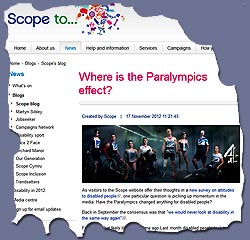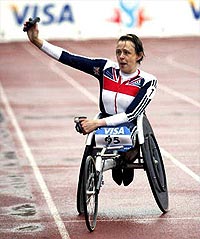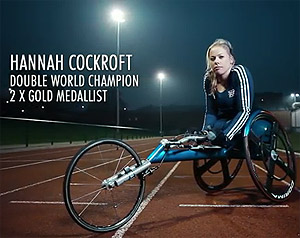On International Day For Disabled People Have Attitudes Changed In The UK?
With Monday 3rd December being this year’s International Day for Disabled People, and in a year of huge success for the Paralympics London 2012; the question has to be asked - Where is the Paralympics effect?
 Scope, a charitable organisation dedicated to working with disabled people and their families at every stage of their lives, and offering practical support; asks about attitudes to disabled people in their new survey.
Scope, a charitable organisation dedicated to working with disabled people and their families at every stage of their lives, and offering practical support; asks about attitudes to disabled people in their new survey.
Scope says, “One particular question is picking up momentum in the media. Have the Paralympics changed anything for disabled people?”
Scope adds:
“Last month disabled people took to the streets to protest against cuts. Report after report underlines the impact of spiralling living costs, stagnant incomes and the loss of national and local support on the lives of disabled people and their families.”
Baroness Tanni Grey-Thompson, a Paralympian herself, has spoken out by stating what many people are thinking. Her answer to the questions ‘Where is the Paralympics effect?” and “Has London 2012 changed attitudes towards disabled people?”; was a resounding “Not in my world!”
In her 9th November Daily Telegraph article she wrote:
“This summer proved that many athletes did cope with adversity, tragedy and disappointment, but it wasn’t limited to Paralympians. There was a new recognition of Paralympians being good athletes. Suddenly it felt that those barriers were being knocked down.
But will it be any easier now for young disabled people to access society? This is not about money, although that always helps: it is about substance. Genuine inclusion is not about sticking a few Paralympians on a poster, or ticking a box that they were in the line-up.”
She adds:
“I have forgotten the number of meetings/events over the years that I could not physically access. Before the Games it did not bother me, because that was the world I grew up in. But it does bother me now because so many people told me that the Games changed their attitude to disabled people, so I would like to see some evidence of that.”
 In a Scope website article she is quoted as describing her experience at a sports dinner:
In a Scope website article she is quoted as describing her experience at a sports dinner:
“I had to use the back entrance, nothing much unusual or offensive in that. However, I could have got in the front (there was a ramp there albeit tucked away) but the organisers just had not thought about it. When I wanted to use the bathroom it took several minutes to find a ramp. I was also asked if I really needed to “go”. While I was in the bathroom the ramp was taken away, so I could not get back down the steps.”
She posed an even more challenging question, in the Times:
"Have the Paralympics made it easier for the Government to strip disabled people of vital support by presenting an unrealistic image of what disabled can achieve?
Don’t be fooled by what Paralympians can do. They are not typical of disabled people. They are remarkably good at the sport they do, but it is not a realistic view of disabled life, no more than Olympians represent anyone else.”, she said.
Scope asks: “So is it time to write off the Paralympics effect?” Their reply to this question?
“Disabled people tell Scope that greater visibility and public discussion of their lives makes a difference.
During the Games Ellie Simmonds, David Weir and Jonnie Peacock become national heroes. With Channel 4 leading the way, Disability was consistently, openly and widely talked about like never before. Three different polls taken straight after the games pointed to a change in public attitudes.
But it takes longer than a fortnight to change attitudes.
 Times are undoubtedly tough for disabled people. But maybe rather than write the Paralympics effect off, we should be asking what we can do to build on it and keep it going.
Times are undoubtedly tough for disabled people. But maybe rather than write the Paralympics effect off, we should be asking what we can do to build on it and keep it going.
What we can do increase disabled people’s visibility in the media, in politics, in the arts and above all in everyday life?
How can we use the Paralympics to make the point to the Government that the starting point for welfare should be what do disabled people need to live their lives – not what can we take away to save money?
As Tanni says we need to keep the fight going.”
In their press release and email to supporters, Scope reminds people about Monday's significance for disabled people, and asks for both support on-line and also asks for views of how, if at all, attitudes have indeed changed in the way in which disabled people are seen.
What is your view of disabled people and the way in which attitudes in this country, in Government are changing, if at all?
Scope wants to hear your views.
You can take part in their survey on attitudes to disabled people here
Source: Scope / Daily Telegraph / The Times / Aviva UKA Academy
See also:
Half Million Disabled Families Denied Local Support Services



 In a Scope website article she is quoted as describing her experience at a sports dinner:
In a Scope website article she is quoted as describing her experience at a sports dinner:  Times are undoubtedly tough for disabled people. But maybe rather than write the Paralympics effect off, we should be asking what we can do to build on it and keep it going.
Times are undoubtedly tough for disabled people. But maybe rather than write the Paralympics effect off, we should be asking what we can do to build on it and keep it going.